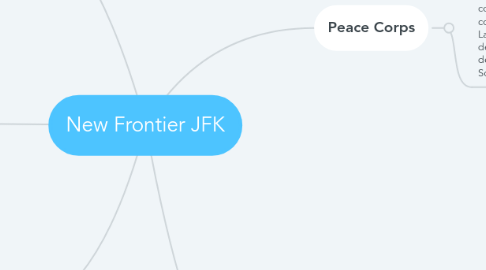
1. Domestic Frontier
1.1. Managing the economy was one of Kennedy's first domestic challenges. He wanted to reassure big businesses and the people. JFK appointed C. Douglas Dillon as the secretary as treasure. Dillon was republican and JFK was democratic, giving it a bipartisan appearance. One failure JFK had was that the unemployment rate did not decline while he was in office. Kennedy received criticism for his heavy handed tactics
2. Evaluate Foreign and Domestic Successes
2.1. Kennedy focused a lot of time on the Cold War and tensions with Cuba and Soviet Union. The Cuban missile crisis marked a historic turning point in U.S.-Soviet relations. Kennedy and Khrushchev sought to ease tensions between their countries. In 1963 the United States, the Soviet Union, and Great Britain signed the Limited Nuclear Test Ban Treaty. This was a major step and success for JFK. JFK had a great effect on the youth and he was very inspiring. Many of them responded to Kennedy’s call for service and sacrifice. Kennedy's idea of American Volunteers fanning out across the globe worked. People were willing to go anywhere with confidence and willingness to help. It gave people faith in young Americans.
3. Assassination of JFK (conspiracy; Warren Commission)
3.1. s
3.2. Kennedy travelled to Texas to build support for his 1964 presidential campaign. Crowds lined the streets he was passing through, and through the downtown area, shots were fired leading to JFK being fatally wounded. Within hours Vice President Johnson was sworn in. Many felt the assassination had killed hope in themselves. Within hours of the shooting, Dallas Police arrested Lee Harvey OSwald. Two days later Oswald was shot to death. This strange turn of events caused many people to question whether Oswald had acted alone in killing the president. o end speculation, President Johnson named a commission headed by Chief Justice Earl Warren to investigate the assassination. This Warren Commission spent 10 months reviewing the evidence. It concluded that there was no conspiracy and that both Oswald and Ruby had acted alone. Despite these findings, many Americans continued to believe that more than one person was involved in Kennedy’s assassination
4. Peace Corps
4.1. The Peace Corps sent American volunteers to work for two years in developing countries. Kennedy introduced the peace corps to help countries in Africa, Asia, and Latin America. He thought that helping developing countries would increase their dependence on the United States and block Soviet influence.
4.1.1. Alliance for Progress
4.1.1.1. The Alliance for Progress offered billions of dollars in aid to participating countries. These countries were expected to begin democratic reforms and encourage capitalism in return for the financial aid given by america. This was in order to decrease the risk of communism spreading to these countries.
4.1.1.1.1. Bay of Pigs
5. Berlin Crisis
5.1. In mid-August the East Germans erected a barbed-wire barrier that cut off traffic between East and West Berlin. Kennedy responded by sending additional U.S. troops to the city. For several days U.S. and Soviet soldiers eyed each other nervously across the barbed wire. Tensions gradually eased when it became clear that Khrushchev’s real goal had been achieved. The barrier had halted the mass departure of East Germans to the West through Berlin. In time, the East Germans replaced the barbed wire with a wall of gray concrete and watchtowers. The Berlin Wall became the most widely recognized symbol of the Cold War.
5.1.1. Challenges (Republican House and Senate and Foreign policy)
5.1.1.1. Kennedy received little cooperation for his legislative agenda from Congress. A coalition of southern Democrats and conservative Republicans in Congress opposed Kennedy’s agenda and successfully blocked most of the president’s domestic programs. Even before Kennedy took office, his advisers recommended a tax cut as a means of stimulating economic growth. A sharp drop in the stock market convinced Kennedy to ask Congress to reduce taxes. Several members of Congress balked. They charged that without a comparable cut in federal spending, the tax cut would lead to financial chaos. Congress failed to pass the measure. Other Kennedy initiatives rejected by Congress included legislation to assist older Americans in paying their medical bills and a bill to provide federal aid for education.

